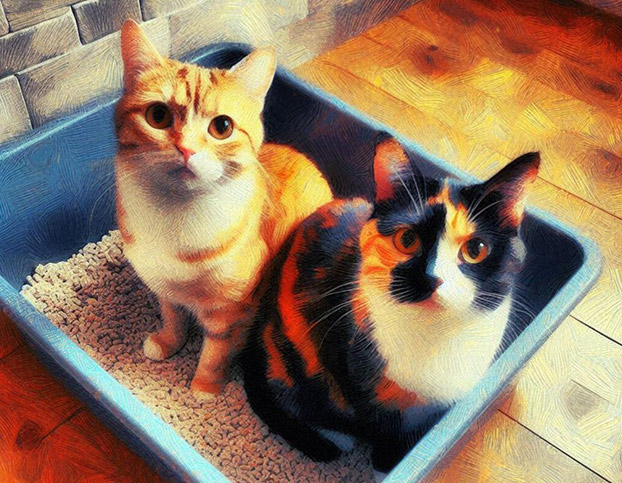As devoted cat owners, we pride ourselves on providing the best care for our furry companions. We carefully choose the right food, the comfiest beds, and the most engaging toys. But sometimes, even with our best efforts, our feline friends can face health challenges that leave us scratching our heads, as well as symptoms that push the bounds of our patience. One such perplexing issue is Feline Idiopathic Cystitis (FIC).
In this blog, we’ll delve into the complexities of FIC. We’ll explore the potential causes, the telltale signs, and practical strategies for managing this frustrating condition. Let’s work together to unravel the mystery and bring some relief to our beloved feline family members.
The Letter Salad of Feline Urinary Issues: FLUTD, FIC, UTI
First, let’s get some definitions out of the way. Feline Lower Urinary Tract Disease, or FLUTD (pronounced “Flu-Dee”) is an umbrella term that encompasses a variety of causes of urinary problems in cats including both medical (such as urinary tract infection, or UTI) and behavioral. Under the umbrella of FLUTD there is the notorious Feline Idiopathic Cystitis, or FIC (pronounced “Eff. Eye. See.”, not “Fick”). So essentially, FIC is one of many causes of FLUTD.
FLUTD is an umbrella term that encompasses a variety of causes of urinary problems in cats.
What is FIC?
Feline Idiopathic Cystitis is benign, non-infectious inflammation of the bladder and urethral lining. Some compare this feline condition to the human condition interstitial cystitis (IC) or bladder pain syndrome (BPS). Importantly, FIC is a “diagnosis of exclusion.” This means it’s diagnosed when all other medical causes of FLUTD have been ruled out. In other words, if tests show your cat doesn’t have any other identifiable cause for their urinary problems such as infection, stones or cancer, then FIC is the likely diagnosis. There are no specific blood or urine tests that directly diagnose FIC; instead, these tests are used to eliminate other potential causes. When those other causes are absent, FIC is diagnosed.
It’s important to remember we described FIC as “non-infectious.” This means the symptoms are not caused by bacterial infections, so your cat won’t need antibiotics. Also, the condition is “benign,” meaning your cat does not have urinary cancer.
What are the symptoms of FIC?
FIC can cause a range of symptoms:- Straining to urinate.
- Producing only small dribbles of urine while attempting to urinate.
- Blood in the urine.
- Meowing while urinating due to discomfort.
- Excessive grooming of the abdomen, potentially due to discomfort. (Remember, cats often over-groom instead of pressing on painful areas.)
- Inappropriate urination outside the litter box. (For example, a recent feline patient we evaluated was urinating on the family’s newborn baby!)
It’s common to assume these symptoms are associated with a UTI requiring antibiotics, but in FIC, this is not the case (read on!)
What Causes FIC and What Can You Do?
Feline Idiopathic Cystitis is a real puzzle! We are still trying to decode it and understand exactly what causes it, but we know it’s not a simple infection, and it’s not cancer. Think of it like a really bad bladder flare-up, and stress is often the main trigger. Here’s a look at what’s going on:
Stress and Your Cat's Nerves
Stress Overload: Cats with FIC seem to get stressed more easily. When they’re stressed, their bodies release a flood of hormones that can irritate their bladder. It’s like their “fight-or-flight” response goes into overdrive, and their bladder pays the price. Things that stress cats out include changes in their routine, living with other cats they don’t get along with, fighting, growling, swatting, and not having enough fun stuff to do. Using synthetic feline facial pheromones (e.g. Feliway) can have a relaxing benefit to cats. Reducing your cat’s stress level is the number one thing you can do to reduce the symptoms of FIC.
A Weakened Bladder Shield
The Bladder’s Protective Layer: Your cat’s bladder has a special lining that protects it from the harsh stuff in urine. In cats with FIC, this lining can get damaged, making their bladder super sensitive. Think of it like a cut on your skin, then you pour lemon juice on it. It stings, right? That is what happens to the bladder. When you combine this weak lining with stress, it’s a recipe for bladder trouble.
What's Happening at Home
Boredom and Anxiety: Cats need mental stimulation! Without scratching posts, climbing areas, and places to hide, they can get stressed. Play with your cat! Dust off that laser pointer! Make sure your cat has plenty of litter boxes, food and water bowls, and cozy spots to relax. Multi cat households can be a large source of stress, so make sure each cat has its own space.
Water and Food: While food isn’t the main cause, keeping your cat well-hydrated is important. More water helps dilute their urine, making it less irritating, and increases peeing.
Litter-ally, Create a Calm Zone
Your home should be a haven, not a battleground. Think about what stresses your cat: other pets, loud noises, changes in routine, litter box issues, boredom? Find ways to minimize these stressors thereby creating a more calm and serene environment that your furry feline friend can thrive in and once again coexist peacefully with the litter box.
Don’t Give Up!
Are your cat’s urinary habits stressing you out? Antibiotics have not helped? Contact us and we can take another look at the underlying issues and help to restore your cat’s urinary habits.

Author:
James Woods DVM, MS, DACVIM (SAIM)
Ph: (912) 721-6410
Contact Us
